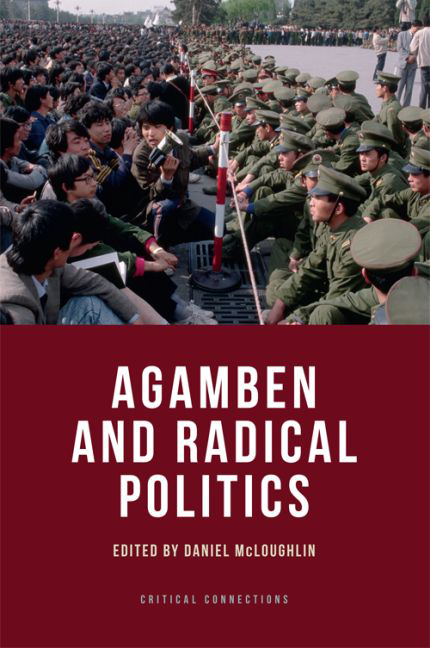Book contents
- Frontmatter
- Contents
- Acknowledgements
- Introduction: Agamben and Radical Politics
- 1 Capitalism as Religion
- 2 Glory, Spectacle and Inoperativity: Agamben's Praxis of Theoria
- 3 On Property and the Philosophy of Poverty: Agamben and Anarchism
- 4 ‘Man Produces Universally’: Praxis and Production in Agamben and Marx
- 5 Liturgical Labour: Agamben on the Post-Fordist Spectacle
- 6 An Alogical Space of Genetic Reintrication: Notes on an Element of Giorgio Agamben's Method
- 7 Zoē aiōniōs: Giorgio Agamben and the Critique of Katechontic Time
- 8 Agamben, Badiou and Affirmative Biopolitics
- 9 Form-of-Life and Antagonism: On Homo Sacer and Operaismo
- 10 What Is a Form-of-Life?: Giorgio Agamben and the Practice of Poverty
- 11 Law and Life beyond Incorporation: Agamben, Highest Poverty and the Papal Legal Revolution
- Notes on Contributors
- Index
2 - Glory, Spectacle and Inoperativity: Agamben's Praxis of Theoria
Published online by Cambridge University Press: 23 September 2017
- Frontmatter
- Contents
- Acknowledgements
- Introduction: Agamben and Radical Politics
- 1 Capitalism as Religion
- 2 Glory, Spectacle and Inoperativity: Agamben's Praxis of Theoria
- 3 On Property and the Philosophy of Poverty: Agamben and Anarchism
- 4 ‘Man Produces Universally’: Praxis and Production in Agamben and Marx
- 5 Liturgical Labour: Agamben on the Post-Fordist Spectacle
- 6 An Alogical Space of Genetic Reintrication: Notes on an Element of Giorgio Agamben's Method
- 7 Zoē aiōniōs: Giorgio Agamben and the Critique of Katechontic Time
- 8 Agamben, Badiou and Affirmative Biopolitics
- 9 Form-of-Life and Antagonism: On Homo Sacer and Operaismo
- 10 What Is a Form-of-Life?: Giorgio Agamben and the Practice of Poverty
- 11 Law and Life beyond Incorporation: Agamben, Highest Poverty and the Papal Legal Revolution
- Notes on Contributors
- Index
Summary
Agamben concludes his essay on Deleuze with a prediction that is also a demand. He writes: ‘Theôria and the contemplative life, which the philosophical tradition has identified as its highest goal for centuries, will have to be dislocated onto a new plane of immanence.’ He goes on to say that the dislocation of theoria – the root of which is the Greek theoros, meaning ‘spectator’, but which is often translated as ‘contemplation’ – will require us to rethink the status of political philosophy and its difference from ontology. Of course, such a rethinking is exactly what he was pursuing at the time of writing his essay, with the Homo Sacer series then in its early stages: a revision of the traditional distinction between politics and ontology that, as I have argued elsewhere, should be understood as post-Heideggerian political ontology. In these works, the difference and relation between theory and practice – which goes back at least as far as Aristotle's Nicomachean Ethics, with its distinction between practical life and the life of contemplation – is called into question, and thereby reaches a new level of sophistication and difficulty.
In this chapter, I work to show how Agamben has extended and complicated his account of this differential relation in The Kingdom and the Glory. Connecting theoria with spectatorship, he intertwines a quasi-Marxist critique of spectacle with a Heideggerian thesis regarding the history of being as nihilism. The resultant political ontology has at its centre a dialectical notion of theoria as a form of praxis. Contra some of Agamben's critics, this is not an attempt at erasing the distinction between philosophy and politics, such that ‘doing ontology’ is taken as an immediately political act, or to provide a substitute for material political change. Rather, dislocating theoria onto a plane of immanence is to render it a practical problem. For this we need a politics capable of rousing the human inoperativity that has lain dormant in theoria, and which the ‘blinding light’ of glory has been obscuring from us. As a form of fundamental ontology, Agamben's thinking cannot lay down a prescriptive blueprint for political action, but it can help us rethink the very concept, founding new strategies for anti-work politics.
- Type
- Chapter
- Information
- Agamben and Radical Politics , pp. 27 - 48Publisher: Edinburgh University PressPrint publication year: 2016



